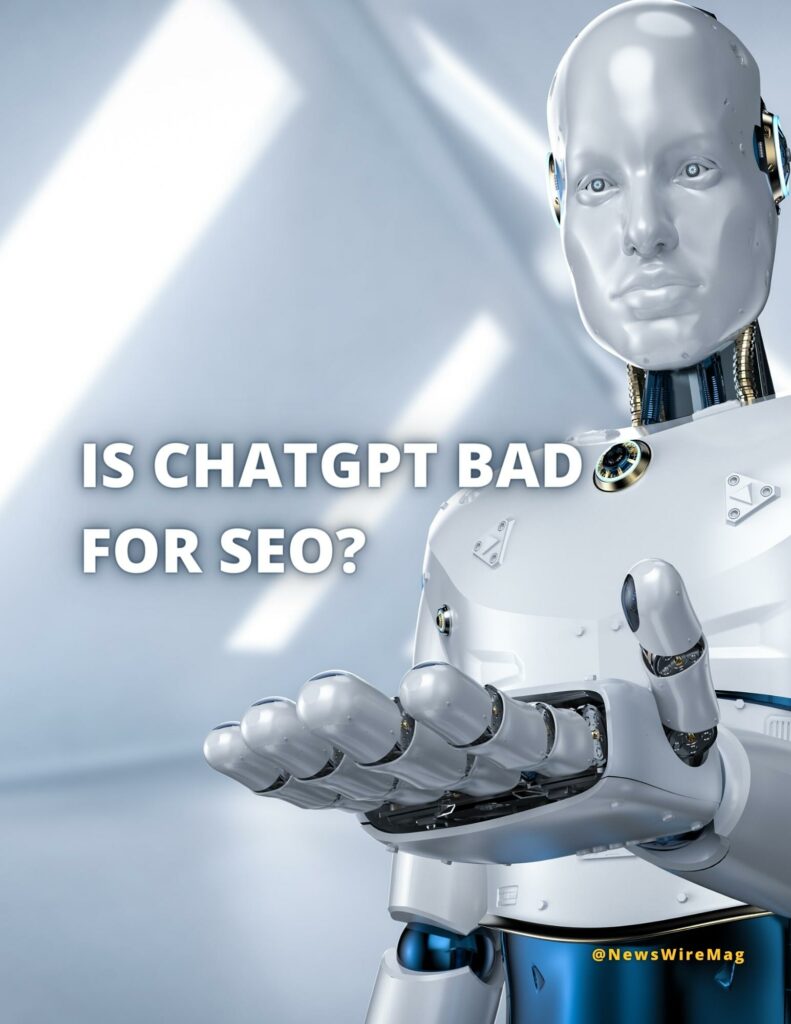Is AI-generated Content Bad for SEO?
Search engines aren’t designed to distinguish between AI-generated and human-written content; they prioritize its quality. Major search engines like Google and Bing don’t have an aversion to AI—in fact, many already offer their own AI technologies.
The primary goal of search engines is to deliver the most relevant and high-quality content in response to user queries. Therefore, if you produce excellent content, you’ll naturally achieve better rankings, regardless of whether AI or human-generated content.
Is ChatGPT bad for SEO?
 The entrepreneurial community has a lingering question: “Is using AI like ChatGPT bad for SEO?” The concern often stems from the idea that AI-generated content might not be as high-quality or SEO-friendly as human-written content. Let’s dissect this notion and provide some actionable insights.
The entrepreneurial community has a lingering question: “Is using AI like ChatGPT bad for SEO?” The concern often stems from the idea that AI-generated content might not be as high-quality or SEO-friendly as human-written content. Let’s dissect this notion and provide some actionable insights.
Quality of Content
- Human Oversight: While ChatGPT can generate content quickly, it’s crucial to have human oversight to ensure the content aligns with your brand’s voice and values. This ensures the quality of the content, which is a significant factor in SEO rankings.
- Originality: ChatGPT is designed to generate unique content. However, always run the content through plagiarism checkers to ensure its originality, as duplicate content can harm your SEO.
SEO Optimization
- Keyword Integration: ChatGPT can naturally integrate keywords into the content, but it’s essential to double-check for keyword density and placement. Overstuffing keywords can be detrimental to SEO.
- Meta Descriptions and Titles: While AI can generate these, a human touch to ensure they are catchy and relevant can make a difference in click-through rates, impacting SEO positively.
User Engagement
- Readability: ChatGPT-generated content is generally easy to read and understand, which can improve user engagement metrics like time spent on the page—a positive signal for SEO.
- Updates: AI tools are continually updated to improve their capabilities. This means that the SEO-friendliness of AI-generated content will likely improve over time.
The Verdict
Using ChatGPT or similar AI tools is not inherently bad for SEO. It can be a valuable asset in your SEO toolkit when used correctly. The key lies in how you use the tool:
- Quality Control: Always review and edit AI-generated content.
- SEO Best Practices: Ensure your content adheres to SEO guidelines, including keyword usage, meta descriptions, and content structure.
- Human Element: Maintain a balance between AI-generated and human-generated content to provide a diverse and engaging user experience.
The notion that ChatGPT is bad for SEO is more of a myth than a reality. Like any tool, its effectiveness depends on how you use it. For the savvy entrepreneur looking to scale their business, integrating AI responsibly into your SEO strategy can offer a competitive edge, freeing up your time to focus on what you do best: innovating and leading.
Automating tasks like content creation can be a game-changer in the entrepreneurial world, where every second counts. AI writing tools like ChatGPT have been making waves, but they also raise a critical question: “Is ChatGPT bad for SEO?” This comprehensive guide aims to debunk myths, provide actionable insights, and guide you on how to use ChatGPT for SEO.
Human Oversight is Crucial
While ChatGPT can churn out articles at an impressive speed, the quality of that content is a significant factor in SEO. It’s essential to have human oversight to ensure the content aligns with your brand’s voice and values.
Actionable Step: Always review and edit AI-generated content to maintain quality.
Originality Matters
ChatGPT is designed to generate unique content, but running the content through plagiarism checkers is always wise. Duplicate content can severely harm your SEO rankings.
Actionable Step: Use tools like Copyscape to ensure the originality of your content.
SEO Optimization: The Devil is in the Details
In the ever-evolving digital marketing landscape, search engine optimization (SEO) is a pivotal yet intricate strategy for enhancing online visibility. While the fundamental principles of SEO are widely acknowledged, it’s often the subtle and overlooked details that can make a remarkable difference in website rankings.
From meticulously crafting meta descriptions that not only summarize but also entice, to fine-tuning the loading speed of mobile pages for an optimal user experience, these seemingly minor elements wield immense power.
Even the strategic use of header tags and the judicious selection of keywords within the content can tip the scales in favor of higher search engine rankings. In this era of cutthroat online competition, the astute attention to these finer points separates the truly effective SEO endeavors from the rest.
Keyword Integration
ChatGPT can integrate keywords into the content, but you must double-check for keyword density and placement. Overstuffing can be detrimental.
Actionable Step: Use SEO tools to check keyword density and adjust as needed.
Meta Descriptions and Titles
While AI can generate meta descriptions and titles, adding a human touch can make them more catchy and relevant, impacting click-through rates positively.
Actionable Step: Manually review and edit meta descriptions and titles for maximum impact.
User Engagement: The Silent SEO Booster
Readability
ChatGPT-generated content is generally easy to read, which can improve user engagement metrics like time spent on the page—a positive signal for SEO.
Actionable Step: Use readability tools to ensure your content is accessible to a broad audience.
Updates and Improvements
AI tools like ChatGPT are continually updated to improve their capabilities, meaning the SEO-friendliness of AI-generated content will likely improve over time.
Actionable Step: Keep your AI tools updated to the latest versions to benefit from enhancements.
Researching Trending Topics with ChatGPT
One of the less-talked-about features of ChatGPT is its ability to help you research trending topics. ChatGPT can suggest topics currently trending in your industry by analyzing vast amounts of data.
Actionable Step: Use ChatGPT to generate a list of trending topics and then create content around those topics to improve your SEO rankings.
Use AI to Generate Interesting Headlines
A compelling headline can significantly impact your click-through rate, affecting your SEO. ChatGPT can generate various headlines based on your input, giving you options.
Actionable Step: Use ChatGPT to generate multiple headline options and pick the one that aligns best with your content and target audience.
Creating an Article Outline
Before diving into writing, having a well-structured outline can make the process smoother. ChatGPT can generate an article outline based on the topic and keywords you provide, helping you organize your thoughts better.
Actionable Step: Use ChatGPT to create an initial outline and refine it to suit your needs.
The Risk of Full Automation
While automating tasks can save time, automating all tasks without human review could harm your website or social media SEO. Quality and relevance cannot be compromised; these areas are where human judgment is (currently) irreplaceable.
Actionable Step: Always incorporate a human review stage in your content creation process, especially when using AI tools.
Conclusion
The question, “Is ChatGPT bad for SEO?” doesn’t have a straightforward answer. Like any tool, its effectiveness depends on how you use it. With the right balance of automation and human oversight, ChatGPT can be a valuable asset in your SEO toolkit.
For the modern entrepreneur, this means more time to focus on strategic decision-making and business growth. So go ahead and leverage AI, but do it wisely. Your search engine rankings will thank you.





